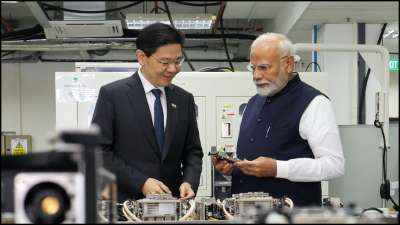Singapore’s semiconductor industry is well-established, accounting for 10% of global semiconductor output and 5% of the world’s wafer fabrication capacity

Manoj Kumar Pathak
The recently signed bilateral partnership agreement on semiconductors between India and Singapore marks a pivotal moment in India’s strategic efforts to bolster its semiconductor ecosystem and reduce reliance on China. This agreement, formalized during Prime Minister Narendra Modi’s visit to Singapore, represents a significant advancement for India’s semiconductor industry and offers new opportunities for Singaporean companies in the Indian market. The Memorandum of Understanding (MoU) outlines a framework for collaboration aimed at strengthening the semiconductor ecosystems of both nations. For India, this is a crucial opportunity to leverage Singapore’s expertise in the field and enhance its own manufacturing capacity.
At a time when geopolitical tensions are rising in the Taiwan Strait and the South China Sea, the importance of building a robust semiconductor industry in India cannot be understated. China’s dominance in the global semiconductor supply chain has raised concerns globally, and India is actively working to reduce its reliance on Chinese imports. This partnership with Singapore is seen as a timely response to this challenge.
Singapore’s semiconductor industry is well-established, accounting for 10% of global semiconductor output and 5% of the world’s wafer fabrication capacity. Nine of the top 15 semiconductor firms operate in Singapore, making it a global hub for semiconductor manufacturing and research. The country plays a vital role in every segment of the semiconductor value chain, from integrated circuit (IC) design to assembly, packaging, and testing. Singapore’s robust infrastructure has allowed it to become a key player in the global semiconductor market, contributing significantly to its economic growth.
In contrast, India is a newcomer to the semiconductor manufacturing industry, heavily relying on imports to meet its needs. India currently imports around 80% of its semiconductor requirements, and the absence of a domestic manufacturing base has been a persistent challenge. The MoU signed with Singapore seeks to address this gap by providing India access to Singapore’s expertise and resources, offering the potential to reduce its semiconductor import dependency. This would not only decrease the import bill but also generate employment opportunities and stimulate economic growth within the country.
India has long aspired to become a hub for semiconductor manufacturing, but despite its strong base in semiconductor design, the hardware manufacturing side of the industry has remained elusive. Over the past 15 years, several initiatives and consortiums have tried and failed to establish chip-making facilities in India. The MoU with Singapore offers renewed hope, particularly in areas like talent development, knowledge-sharing, and managing semiconductor industrial parks. Singapore’s expertise in these areas, coupled with India’s abundant land and competitive labor costs, could encourage Singaporean companies to expand their operations in India, creating a symbiotic relationship that benefits both nations.
The significance of this partnership goes beyond economic considerations. In today’s geopolitical environment, the ability to produce semiconductors domestically is a strategic necessity. The ongoing global chip shortage, exacerbated by the COVID-19 pandemic, has highlighted vulnerabilities in the global supply chain and underscored the importance of reliable sources for semiconductors. Semiconductors are the backbone of modern technology, impacting sectors such as automobiles, smartphones, consumer electronics, and critical infrastructure. Ensuring a steady and secure supply of semiconductors is not just an economic issue but also a matter of national security.
India has introduced several attractive incentives to promote domestic semiconductor manufacturing and encourage global semiconductor companies to set up fabrication plants (fabs) within the country. These incentives align with India’s broader vision of becoming a global electronics manufacturing hub, reducing its dependence on imports from countries like China. In this context, the MoU with Singapore marks a significant step toward realizing this vision.
The global semiconductor market is expected to grow to $1 trillion by 2030, and countries that fail to establish their own semiconductor manufacturing capabilities risk falling behind in the global technology race. The semiconductor industry is resource-intensive and requires a highly skilled workforce—skills that are already in short supply globally. By building its own semiconductor industry, India not only aims to become self-sufficient but also to secure its position in this rapidly growing and strategically important sector.
The semiconductor agreement between India and Singapore holds immense potential, both in terms of economic growth and geopolitical strategy. By fostering collaboration between the two nations, this partnership helps India build a strong foundation for its domestic semiconductor industry while reducing its reliance on imports, particularly from China. Singapore’s established semiconductor ecosystem and technical expertise, combined with India’s favorable manufacturing conditions, create a powerful synergy that can drive both nations toward greater success in the semiconductor sector.
For India, the ability to manufacture semiconductors domestically is vital to its ambition of becoming a global electronics manufacturing powerhouse. As the demand for semiconductors continues to grow worldwide, this partnership with Singapore will play a critical role in shaping India’s future in the high-tech industry. The agreement not only enhances India’s semiconductor capabilities but also strengthens its position on the global stage, making it a key player in one of the most important industries of the 21st century.


